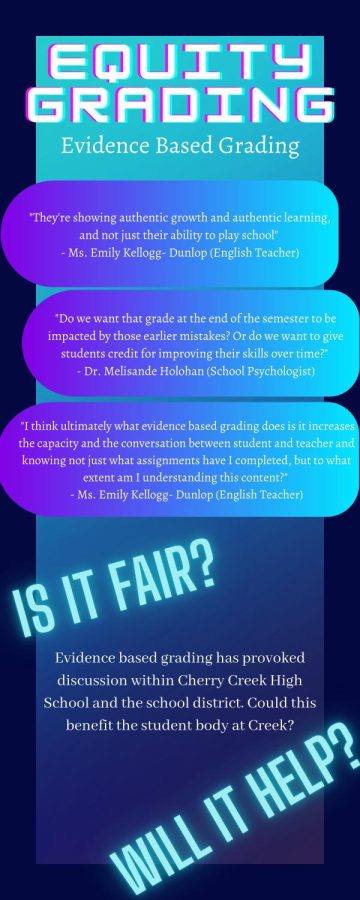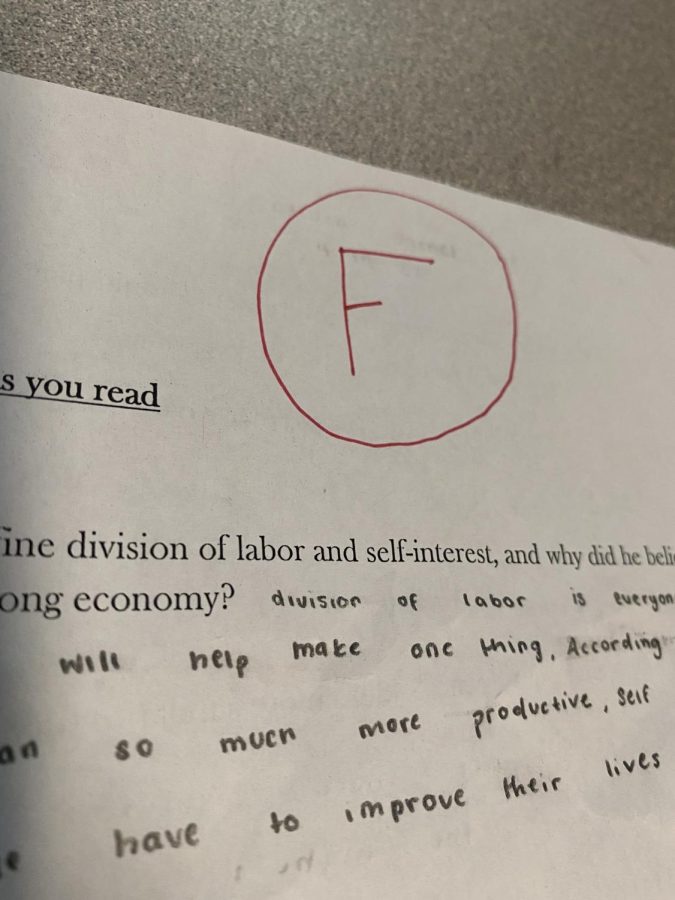Grading for Success: How Evidence Based Grading has Impacted Creek
Evidence based grading has been a topic that has prodded the education system in the last decade. The idea has now become more prevalent at Creek with around 20 teachers taking part in the system this year. Evidence based grading is to show the growth and understanding a student has on a concept, it theoretically allows students to make mistakes but not have to be completely defined by that mistake.
May 18, 2022
A student sits in the back of a class holding their latest test. They stare down at the bright red “F” staining the top of the paper, a million thoughts go through their head – all except one, “How can I master this material?”
Evidence based grading has been a topic that has prodded the education system in the last decade. The idea has now become more prevalent at Creek with around 20 teachers taking part in the system this year. Evidence based grading is to show the growth and understanding a student has on a concept, it theoretically allows students to make mistakes but not have to be completely defined by that mistake.
Grades are the center of most high schoolers’ thoughts, and a major source of stress as well. English teacher Emily Kellogg-Dunlop expressed a concern for the impact of a failing grade, saying “the research tells us that giving kids an F actually doesn’t motivate them.”
However, can this normalization of failure impact the student’s interaction and engagement in class? One of Creek’s psychologists, Dr. Melisande Holohan, who is a member of the grading committee thinks it could. “One of the goals is to increase student engagement with content,” Holohan said. “I think there’s part of that wanting to build a relationship with our students that isn’t just based on points but that’s based on what you learn.”
 Student engagement and involvement has always been a concern in the education system. Evidence based grading proposes that if students take away the high stakes learning environment in the classroom, students will be more concerned about the content they are learning.
Student engagement and involvement has always been a concern in the education system. Evidence based grading proposes that if students take away the high stakes learning environment in the classroom, students will be more concerned about the content they are learning.
“It allows kids to see that they can dig out of a hole more quickly,” Kellogg-Dunlop said. “It empowers them to say, my learning isn’t just something that’s done to me, my learning is something I’m owning, and if I know that I’m not understanding it, I’m going to get the help that I need. So, it makes a student more of an equal partner in their education.”
In addition, a competitive school environment like Creek’s can be detrimental to a student’s mental health.
“We ask our kids, especially our kids who want to have an A plus on everything all the time, to be 100% perfect all of the time,” Kellogg-Dunlop said. However, she expressed that that level of perfection is rarely achieved in the adult world.
In light of this, lessening the impact of an F could help boost a student’s confidence and desire to learn.
“It’s not that we want to take away a focus on performance, like we want [students] to be prepared, either for college or for jobs, or whatever it is [they’re] doing after high school, there are going to be performance expectations,” Holohan said. “But we want [students] to know, if you fail, how to then turn that around and make it a success.”
Is this grading system making any impact on students? Although there is no definitive data, some teachers have noticed anecdotal changes.
“This point in the semester, I don’t have any students who have an F, and normally I would.” says Kellogg-Dunlop
School is to educate the next generation, to inspire students to try and leave an impact on the world. Could an environment that bases your intelligence on a traditional 0 – 100 grading scale hurt students’ motivation and desire to learn? Since COVID, many students could feel behind and unmotivated for school. These teachers are trying to fill the gaps and rebuild the confidence of students at Cherry Creek High School. According to Kellogg-Dunlop, equity-based grading is about “allowing kids the time and space to fail quickly, frequently and cheaply.”



![English teacher Joel Morris wears his yellow Dr. Martens.
Because Morris has synesthesia, he associates colors with other topics such as the days of the week, yet he does not feel the need to color coordinate what he wears with those colors. “I don't feel like I need to color coordinate at all because it's not really about [how] I have to match the color,” Morris said. “It's just that when I think of Monday, I think red.”](https://unionstreetjournal.com/wp-content/uploads/2022/05/morris-300x400.jpg)


















